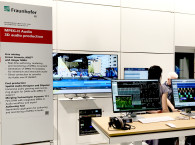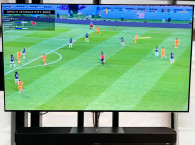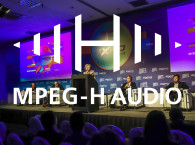
At the 84th meeting of the DVB Steering Board (SB), which took place November 17, 2016, the latest specification for Ultra High Definition Television, UHD-1 Phase 2, was approved. The new specification is a major milestone for the industry, guaranteeing interoperability and enabling broadcasters and CE manufacturers to provide UHD-1 Phase 2 products and services. This could mean that the first DVB UHD-1 Phase 2 services, that include the new features, would be available from next year.
The specification covers various elements for the improvement of video and audio quality for broadcast TV services including High Dynamic Range (HDR) which significantly increases the contrast ratio and results in pictures with more ‘sparkle’. The DVB solution supports Hybrid Log Gamma (HLG) and PQ (Perceptual Quantizer). Furthermore, the new specification defines Higher Frame Rates (HFR), going beyond the current 50/60 Hz. HFR offers sharper images of moving objects. When it comes to audio, DVB has added the latest Next Generation Audio (NGA) schemes supporting object- or scene-based audio, including Dolby, DTS and MPEG-H formats. These new features can be combined with HD and UHD resolutions. The specification was now published as BlueBook A157 and will be passed to ETSI for formal publication as TS 101 154 v2.3.1.
 Commenting on the new specification, DVB Chairman, Peter MacAvock said, “Today’s approval of the specification is the result of enormous effort from the contributors, and further evidence of DVB’s leadership in the broadcast industry. DVB views the Phase 2 specification as a key enabler for exciting products and services.”
Commenting on the new specification, DVB Chairman, Peter MacAvock said, “Today’s approval of the specification is the result of enormous effort from the contributors, and further evidence of DVB’s leadership in the broadcast industry. DVB views the Phase 2 specification as a key enabler for exciting products and services.”The specification was a massive team effort with over 30 companies and other interested parties participating through the DVB Commercial Module, the Technical Module and the Steering Board. It is estimated that some 36 online meetings and 14 physical meetings took place over the 3 years. This commitment by DVB Members bears testament to how standards’ bodies play an important role and emphasizes the importance of getting consensus and wide approval for new standards.
David Wood, Chair of the DVB Commercial Module for UHDTV who oversaw much of the work on the specification, commented, “When they draw up the history of television, the agreement by the DVB Steering Board to the UHD-1 Phase 2 specification will surely be writ large. It marks the culmination of many years work by scores of DVB Member engineers, and is probably the tipping point for the new age of UHDTV.”
Digital Video Broadcasting (DVB) is an industry-led consortium of broadcasters, manufacturers, network operators, software developers, regulators and others from around the world committed to designing open interoperable technical standards for the global delivery of digital media and broadcast services.
DVB standards cover all aspects of digital television from transmission through interfacing, conditional access and interactivity for digital video, audio and data. DVB dominates the digital broadcasting environment with thousands of broadcast services around the world using DVB’s standards. There are hundreds of manufacturers offering DVB compliant equipment. To date there are over a billion DVB receivers shipped worldwide.
www.dvb.org | www.dvbservices.com | www.dvbworld.org








